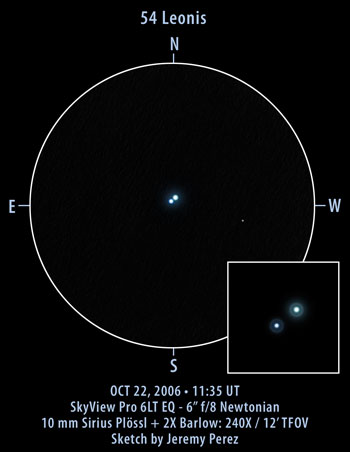
Observation Notes:
54 Leonis showed a beautiful color combination to my eye. The primary appeared as a pale blue-green next to a deep blue secondary. Once again, I’m seeing a greenish contrast effect on a primary instead of the secondary. What can I say? I’m still trying to figure it out. The stars appeared to be separated by about 4 first-diffraction-ring radii, or 5 arcseconds for my scope. The 1987 WDS value is actually 6.5 arcseconds. My PA estimate was 110 degrees, which lines up nicely with the 1987 WDS value of…are you ready…110 degrees. Ka-bam. Every once in a while, I guess.
Just wait ’til I get an astrometric eyepiece involved in this 😉
| Subject | 54 Leonis (STF 1487) |
| Classification | Double Star |
| Position (J2000) | [RA: 10:55:36.7 / Dec: +24:44:58]* |
| Position Angle* | 103° (1830) 110° (1987) |
| Separation* | 6.2″ (1830) 6.5″ (1987) |
| Magnitudes* | A = 4.5; B = 6.3 |
| Spectral Types* | A = A1V; B = A2Vn |
| Date/Time | OCT 22, 2006 – 04:35 AM MST (OCT 22, 2006 – 11:35 UT) |
| Observing Loc. | Cinder Hills Overlook, Sunset Crater National Monument, AZ |
| Instrument | Orion SVP 6LT Reflector (150 mm dia./1200 mm F/L) |
| Eyepieces/Mag. | 10 mm + 2X Barlow (240X) |
| Conditions | Clear, calm |
| Seeing | 5/10 |
| Transparency | NELM Mag 6.8+ |
| References | The Washington Visual Double Star Catalog, 1996.0 (Worley+, 1996) via VizieR |
*Based on published data.